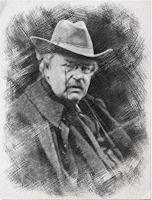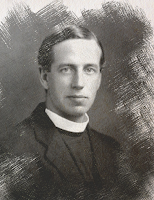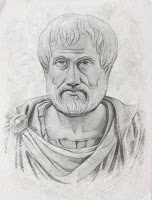Our previous posting on this subject was an expansion of a comment we made on an article, “Catholics and Race in American History,” on the website of the Catholic World Report, a Catholic webzine. We thought we were agreeing with the author, Kevin Schmiesing, but adding a few interesting tidbits we’ve uncovered in our research as well as a little analysis of our own.
 |
| G.K. Chesterton |
Kevin Schmiesing, by the way, is Director of Research at the Freedom and Virtue Institute, a research associate at the Veritas Center for Ethics in Public Life, and an instructor of Church history for the Archdiocese of Cincinnati’s Lay Ecclesial Ministry Program. He speaks weekly about Church history on EWTN radio’s Son Rise Morning Show and is co-host of the Catholic History Trek podcast.
Given the fact that we thought we were agreeing with the author of the article, you can imagine our surprise when someone left the following comment:
Gary J. Zelch
So Mr. Greaney, you have opted for the “censorius [sic] approach” which Mr. Schmeising [sic] warns against, and jumped on the Howard Zinn bandwagon of “The United States is the most evil country, with the most evil people, and evil intentions from its inception.” Learn from the past, not live in it, indeed. Shall we try it?
After composing and posting our response to Mr. Zelch (link to the original above, the expanded version below), we got curious as to who this Mr. Zelch might be, so we googled his name. It turns out, according to the website of the Society of G.K. Chesterton (formerly known as the American Chesterton Society), that Gary J. Zelch is a leader in the?/of the? Worcester (Massachusetts) Chesterton Society, a factoid of which we were, swerdagot, completely unaware when we wrote our response larded with Chestertonian references.
 |
| St. Thomas Aquinas |
We were, admittedly, taken a trifle aback by the vehemence of Mr. Zelch’s comment, which seemed a bit over the top as well as uncalled for. He did, after all, seem to read somewhat more into our comment than we intended. His attitude, in fact, came across as perhaps a smidge un-Chestertonian, unless we’ve been getting the wrong impression of G.K.C. from his writings.
As Chesterton explained in what we consider his best book (although you are perfectly free to disagree), Saint Thomas Aquinas: The “Dumb Ox” (1933), quite a few people, even Chestertonians, have succumbed to many of the things G.K.C. deprecated and to which (in our opinion) he dedicated his life to opposing. In particular, he worked to reverse the effects of the “New Things” (rerum novarum) of modernism and socialism.
In our opinion — for what it’s worth — modernism consists of imposing the supernatural onto the natural, and socialism consists of forcing the natural onto the supernatural instead of working so that each one completes and fulfills the other. That is why Chesterton characterized socialism as the obvious attack on the Church from the outside, and modernism as the more subtle attack from the inside.
 |
| Msgr. Ronald A. Knox |
As a result, both reason and faith have been emasculated (so to speak) in the modern world, i.e., that of the last two centuries or so. Consequently, and accounting for much of the acrimony, even malice and vindictiveness in today’s world, there is no generally accepted basis for arguing natural or supernatural matters based on reason illuminated and guided by faith. Virtually everything is personal opinion. Moral relativism rules and might makes right. As Msgr. Ronald Knox put it in Enthusiasm (1950), for those who view themselves as morally superior to others, those others, the “ungodly” (i.e., those who disagree with you) have no rights, and their human dignity need not be respected.
Explaining why this is so might come across as a trifle esoteric, but it’s important. Reason is proved by empirical evidence and logical consistency, that is, reason applies to that which is manifestly true. On the other hand, faith applies to that which is not manifestly true, that is, that cannot be proved by empirical evidence or logic, but at the same time cannot contradict anything that has been so proved. This is the first principle of reason on which Aquinas — the “Dumb Ox” — built his entire philosophy: that which is true is as true, and is true in the same way, as everything else that is true.
That’s called the principle or law of identity and is the “positive” statement of the first principle of reason. The “negative” statement is the principle or law of (non) contradiction: nothing can both be and not be at the same time under the same conditions.
Obviously, once you have confused the natural and the supernatural, that is, the roles of faith and reason, rational argument becomes impossible. Not surprisingly, then, all that is left is sneering at anyone who disagrees with you, whom you think is disagreeing with you, or who might disagree with you. As Chesterton said,
If you argue honestly, as St. Thomas always did, you will find that the subject sometimes seems as if it would never end. He was strongly conscious of this fact, as appears in many cases; for instance his argument that most men must have a revealed religion, because they have not time to argue. No time, that is, to argue fairly. There is always time to argue unfairly; not least in a time like ours. Being himself resolved to argue, to argue honestly, to answer everybody, to deal with everything, he produced books enough to sink a ship or stock a library; though he died in comparatively early middle age. Probably he could not have done it all, if he had not been thinking even when he was not writing; but above all thinking combatively. This, in his case, did not mean bitterly or spitefully or uncharitably; but it did mean combatively. As a matter of fact, it is generally the man who is not ready to argue, who is ready to sneer. That is why, in recent literature, there has been so little argument and so much sneering. (G.K. Chesterton, Saint Thomas Aquinas: The “Dumb Ox”. New York: Image Books, 1956, 126.)
With that in mind . . .
* * *
With all due respect, Mr. Zelch, you are mistaken. To admit that errors have been made in the past and offer a hope for correcting them is not jumping on anyone’s bandwagon. I am, in fact, rather puzzled by your putting words into my mouth and declaring that I am on that of Howard Zinn.
 |
| Aristotelian natural law |
According to that font of fallible information, the Wikipedia, Howard Zinn was, in his own words, “something of an anarchist, something of a socialist. Maybe a democratic socialist.” I am not an anarchist of any kind, or a socialist, democratic or otherwise. I have, in fact, been accused by a number of Chestertonians of being a capitalist and a dissenter from Catholic social teaching for my adherence to what I believe to be the correct, Aristotelian-Thomist understanding of natural law as expressed in the social teachings of the Church.
Neither do I believe that America, etc., is evil, nor did I make any such claim in my comment, either by explicit statement or by implication. I will now state plainly, however, that not only is America not the most evil country, etc., I agree with Abraham Lincoln that it is the last, best hope of Earth. Nevertheless, to whitewash the past and pretend that good is evil and evil is good is to live in a fool’s paradise and allows injustice to continue.
 |
| Alexis de Tocqueville |
I am not alone in this opinion. Alexis de Tocqueville in the 1830s said pretty much the same thing in Democracy in America. He considered the American system the best the world had ever developed, but with two existing flaws, and one potential danger.
The flaws were slavery and the treatment of native peoples. The danger was that Americans would abandon their true, personalist “Catholic” (according to de Tocqueville) notions of equality and liberal democracy and adopt collectivist European and elitist English notions of liberal democracy. Most of the nineteenth century popes approved of the personalist American system, especially Pius IX and Leo XIII, albeit with some reservations.
 |
| Pope Pius IX |
When Pius IX promulgated a constitution for the Papal States, “the Fundamental Statute,” he modeled it on the U.S. Constitution (although William Ewert Gladstone was convinced the pope used the unwritten English constitution as his source). On his jubilee Leo XIII received a specially engrossed copy of the U.S. Constitution as a personal gift from President Grover Cleveland. He kept it in the papal apartments and showed it to favored visitors.
Lincoln’s 1862 Homestead Act delayed for a time the danger that de Tocqueville feared. By 1893, however, Frederick Jackson Turner observed in his “Frontier Thesis” that in his opinion the end of “free” land meant the end of the uniquely American form of liberal democracy. From that point on, America would, in Turner’s opinion, become more “European” and collectivist as well as elitist.
 |
| Peter S. Grosscup |
In the early twentieth century, Judge Peter S. Grosscup, one of Theodore Roosevelt’s “trust busters,” addressed the problem. He wrote a series of articles urging legal reforms that would enable ordinary Americans to purchase corporate equity. This, in Grosscup’s opinion, would “people-ize” the corporation, breaking up the large concentrations of wealth that he believed were a danger to the American way of life.
Grosscup was acquainted with Archbishop John Ireland, America’s leading expert on Rerum Novarum, and often spoke before Catholic groups, including the Knights of Columbus, on the importance of widespread capital ownership and the dignity of the human person under God. In doing so he earned the ire of nativists who claimed he was a crypto Catholic and therefore un-American. Unfortunately, in common with Chesterton and Belloc (who may have been familiar with his writings), Grosscup gave no financially feasible means whereby ordinary people could become owners without redistributing existing wealth (socialism) or redefining ownership (modernism).
 |
| Louis O. Kelso |
It was not until the 1950s with the publication of The Capitalist Manifesto (a title more clever than descriptive) by lawyer-economist and ESOP-inventor Louis Kelso and “Great Books” philosopher Mortimer Adler that the problem was solved, and a practical, non-redistributive means developed to finance widespread capital ownership and maintain a personalist economic and political system. This still has the potential to restore and preserve the natural right to private property for all and implement Leo XIII’s vision, correcting the flaws of the past, and reestablishing America on its original, natural law basis.
So, no, Mr. Zelch, I do not claim that America is the most evil country in the world, but the best and the greatest — which is not to say it is by any means perfect. You don’t love your country by being blind to its faults, but by trying to correct them. As Chesterton said, saying “My country, right or wrong,” is like saying, “My mother, drunk or sober.”
 |
| Mortimer J. Adler |
I would suggest you take a look at Gene Gordon’s website, and possibly that of the interfaith Center for Economic and Social Justice as well before making any similar declarations about someone’s opinions or passing judgment.
You might also find our upcoming book, The Greater Reset: Reclaiming Personal Sovereignty Under Natural Law, from TAN Books, due out March 15, 2022, of interest. While primarily offering a natural law-based alternative to the “Great Reset” of Klaus Schwab and the World Economic Forum, it also presents a possibly new perspective on the origins and influence of the “New Things” of socialism and modernism, and a somewhat different understanding of social justice than that promoted by adherents of the New Things.
Incidentally, The Greater Reset applies the principles presented in our previous book, Economic Personalism: Property, Power and Justice for Every Person. Chesterton and Belloc are featured in both books, although perhaps not in a manner or from a perspective familiar to many of today’s Chestertonians.
#30#
